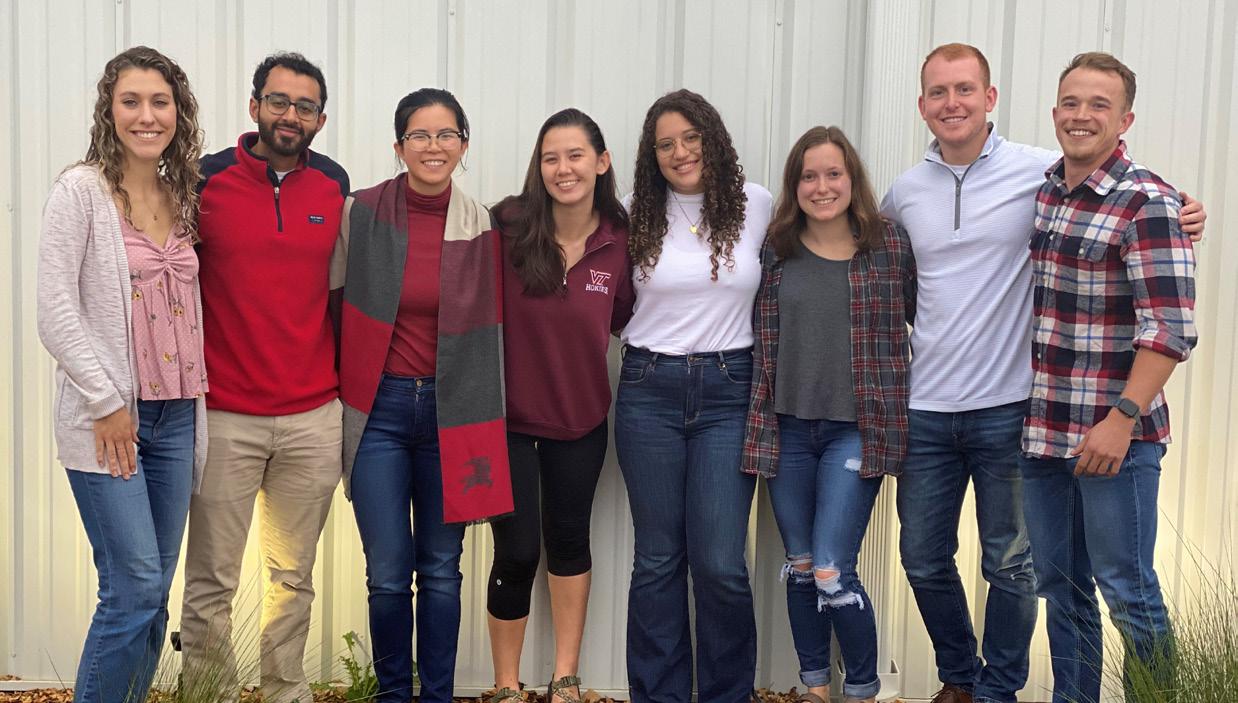
3 minute read
Vecellio Construction Engineering and Management Program
CONSTRUCTION ENGINEERING AND MANAGEMENT
Vecellio Construction Engineering and Management Program graduate students
Advertisement
The Vecellio Construction Engineering and Management Program (VCEMP) had another successful year amidst the COVID pandemic. The program welcomed 21 new graduate students who joined 29 existing students in the program. In addition, VCEMP faculty were actively preparing to co-host the 2022 Construction Research Congress with ASCE’s Construction Institute (https://cisummit-crc. asce.org/). Mike Garvin is serving as co-chair of the conference while Farrokh Jazizadeh and Tripp Shealy are serving as co-chairs of the technical committee. The VCEMP faculty team managed the review process for over 400 conference papers, which will be presented at the conference in March 2022. You can read more about the event on page four of this report.
Planning and coordination of the 20th Vecellio Distinguished Lecture also resumed. The lecture will take place in October 2021 where DJ Gribbin will speak about the challenges of infrastructure policy formation. In addition, five undergraduate Vecellio Scholarships and four Vecellio Fellowships were awarded to students who have demonstrated leadership, academic excellence and an interest in pursuing a career in the construction industry. Scholars are Johnathan Arner, Kelly Crocker, Alex Eng, Shadia Jrab and Rosie Lyman while Fellows are Tianzhi He, Paulo Ignacio, Jr., Daniel Keku and Ushma Manandhar.
Faculty from the program remain active in research, teaching, and outreach. Mike Garvin continued to work on enhancements to a Federal Highway Administration (FHWA) decision support tool called Contracting Alternatives Suitability Evaluator (CASE) that helps public agencies evaluate and document the risk and value associated with various alternative project delivery methods (design-build, progressive design-build, construction manager/ general contractor, and public-private partnerships) He also conducted several training workshops about CASE for state DOTs. Mike was also elected into the National Academy of Construction, which recognizes national leaders in design and construction. He will be inducted into the Academy in Colorado Springs in October, 2021.
Farrokh Jazizadeh continued his research on two NSF grants that focus on enabling intelligent physical and virtual environments that support human interactions with the built environments for energy efficiency enhancement and learning new skills. He has received funding from the Department of Transportation - Federal Railroad Administration to develop Artificial Intelligence tools for human-in-the-loop and datadriven assessment of infrastructure performance to move towards automation and supporting human operators with improved decision making in day-to-day maintenance activities. His research team has developed multiple algorithmic frameworks to achieve these objectives. This project has moved to the second phase. Through field experimentations and data-driven algorithm development, his team has worked on a Covid-19 related project to enable smart building systems to assess and mitigate viral exposures in indoor environments for safe operations in buildings and improved Indoor Air Quality.
Tripp Shealy was selected by alumni, faculty, and students for the Alumni Teaching Excellence Award for 2021, which recognizes his dedication to teaching and the promotion of the civil engineering profession. Dr. Shealy’s teaching is heavily influenced by his research. He completed two sponsored projects exploring how students learn about climate change and students’ ability to think in systems. Dr. Shealy’s research found that civil engineering students nationally tend to not understand the causes or ways to mitigate the effects of climate change. In another project, Dr. Shealy measured the effect of concept mapping on student cognition by examining the change in brain function using a tool called functional near-infrared spectroscopy. Dr. Shealy’s team is also using this tool to measure the effect of indoor environments on human cognition, which could lead to new insights about how to design spaces to promote mental health. Dr. Shealy published seven peer-reviewed journal papers this year and advised two Ph.D. students to their completion.










